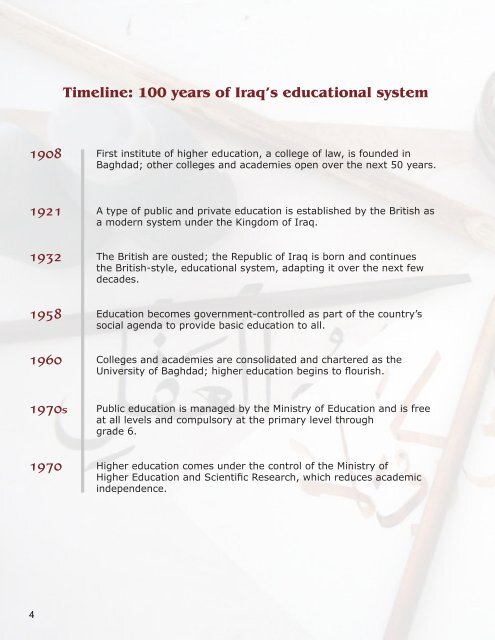Siovana el-Nashir - Final Project Booklet
Create successful ePaper yourself
Turn your PDF publications into a flip-book with our unique Google optimized e-Paper software.
Tim<strong>el</strong>ine: 100 years of Iraq’s educational system<br />
1973 Iraq benefits from oil revenues reinvested in industry, education and<br />
healthcare, raising its standard of living to one of the highest in the<br />
Arab world.<br />
1908 First institute of higher education, a college of law, is founded in<br />
Baghdad; other colleges and academies open over the next 50 years.<br />
1975 Start of a 5-year plan to emphasize science and technology to<br />
strengthen the country’s workforce.<br />
1921 A type of public and private education is established by the British as<br />
a modern system under the Kingdom of Iraq.<br />
1979 Saddam Hussein becomes Iraq’s president and changes the climate<br />
in higher education from one of learning arts and sciences into a<br />
platform for Ba’athist ideology and policies.<br />
1932 The British are ousted; the Republic of Iraq is born and continues<br />
the British-style, educational system, adapting it over the next few<br />
decades.<br />
1980s<br />
Education starts to steadily deteriorate as the Iraqi government<br />
diverts education and social services funds into financing the 8-year<br />
war with Iran.<br />
1958 Education becomes government-controlled as part of the country’s<br />
social agenda to provide basic education to all.<br />
1960 Colleges and academies are consolidated and chartered as the<br />
University of Baghdad; higher education begins to flourish.<br />
1970s<br />
Public education is managed by the Ministry of Education and is free<br />
at all lev<strong>el</strong>s and compulsory at the primary lev<strong>el</strong> through<br />
grade 6.<br />
1970 Higher education comes under the control of the Ministry of<br />
Higher Education and Scientific Research, which reduces academic<br />
independence.<br />
1990s<br />
Economic sanctions and the 1990 Gulf War continue to drain Iraq’s<br />
educational system. Teachers’ salaries decrease and attendance<br />
declines as children drop out to take jobs to supplement family<br />
incomes.<br />
1996 To soften the impact of sanctions against Iraq, the United Nations<br />
and Saddam agree to the Oil-For-Food Program in which Iraq s<strong>el</strong>ls<br />
oil in exchange for food and other humanitarian goods. Iraq’s<br />
educational system benefits little from the program.<br />
2003 US and coalition forces invade Iraq, ending Saddam’s regime yet<br />
uprooting the country’s infrastructure. Educational reforms are<br />
established to modernize Iraq’s educational system and rebuild its<br />
schools.<br />
4 5


